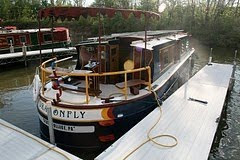 |
| Welcome to our mobile convention center! |
The overall project is called GLOBE, which stands for Global Learning and Observations to Benefit the Environment. GLOBE gets kids from 111 countries involved in collecting data for a variety of projects; the specific project that Liz heads up (and Steve and the Cap'n contribute to) is called FLEXE (From Local to Extreme Environments).
 |
| A benign (NOT extreme) environment--the Tennessee River in autumn |
The conference hotel may have been less glamorous than hotels in typical convention destinations such as New York or Chicago (our guests gamely bunked in a vintage mobile home, available to rent at the marina), but hey, have you ever had cocktail-hour-on-a-canal-boat-while-birdwatching at a convention in either town? We thought not.
When the day's work was finished, we cast off our lines and the Cap'n navigated the winding channel out to the Tennessee River, heading toward the aptly named Duck River and the Tennessee National Wildlife Refuge in search of white pelicans, bald eagles, and egrets by the gaggle.
Because our guests had a car, we were also able to go out to dinner. It was simultaneously a great treat to get off the boat, and seriously thought-provoking.
 |
| While we're talking hot button issues, a reminder: It's election season. This citizen put HIS lawn sign on the riverbank, where it would get more views. (Don't forget to vote.) |
Birdsong is far from any centers of civilization, and we ended up driving more than 40 minutes to Paris, Tennessee and a cute little honky tonk seafood shack (locally owned, NOT a chain) where the funny, friendly waitress (bemused by our Yankee accents and quirks) and the live entertainment (which I can only describe as Nashville karaoke) nearly compensated for the tiny and tough fried oysters.
Thirty-five miles out, thirty-five miles back, just to have dinner. After nearly five months on the boat, where the vast majority of our meals have been made from ingredients we fetched on foot or by bike, I was adding up the amount of fuel burned in my head. It felt dangerously extravagant. But if you've ever lived in a small town, in a rural area, you know that's how it works these days.
 |
| And SPEAKING of unsustainable choices, how about these stilt homes on a fast-eroding bank of the Tennessee River? |
Liz and Steve brought us some gifts from civilization, including Kentucky bourbon and the current (October 2010) issue of National Geographic, a special report on the recent Gulf oil spill. I found the Editor's Note striking, and I quote (lightly edited):
It is 150 years, seven months and 24 days from the day when Edwin Drake drilled the first successful oil well near Titusville, Pennsylvania (our current home state) to the blowout of the Deepwater Horizon rig . . . this past spring. We have been dealing with the consequences of our petroleum-fueled lifestyle ever since.
Drake's well . . . launched the modern oil industry. Oil from . . . that era went mostly into kerosene, which was replacing whale oil for lighting. Henry Ford's company, which would ultimately put car keys in millions of hands, was nearly half a century away. . . petroleum-based polymers, plastic bottles and bags, fertilizer, jet planes . . . had not yet arrived.
The photographs in this issue--an oil-soaked pelican, a tarry shoreline, the despair on fishermen's faces--remind us there is more to the cost of oil than ticking numbers at the fuel pump.
To be continued . . .





Ah! Birdsong Resort. Someday I'll return there with my children to share the memories. How far in advance should we reserve our lavish mobile home?
ReplyDeleteOK, maybe I won't.
Thank you for allowing us to slow down for a little bit and enjoy life and great company.